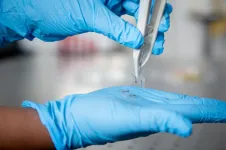(Press-News.org) UNIVERSITY PARK, Pa. -- Approximately 40,000 children in the United States may have lost a parent to COVID-19 since February 2020, according to a statistical model created by a team of researchers. The researchers anticipate that without immediate interventions, the trauma from losing a parent could cast a shadow of mental health and economic problems well into the future for this vulnerable population.
In the researchers' model, for approximately every 13th COVID-related death, a child loses one parent. Children who lose a parent are at higher risk of a range of problems, including traumatic prolonged grief and depression, lower educational attainment, economic insecurity and accidental death or suicide, said Ashton Verdery, associate professor of sociology, demography and social data analytics and Institute for Computational and Data Sciences co-hire, Penn State.
"When we think of COVID-19 mortality, much of the conversation focuses on the fact that older adults are the populations at greatest risk. About 81% of deaths have been among those ages 65 and older according to the CDC (Centers for Disease Control and Prevention)," said Verdery, who is also an affiliate of the Population Research Institute at Penn State. "However, that leaves 19% of deaths among those under 65 -- 15% of deaths are among those in their 50s and early 60s and 3% are among those in their 40s. In these younger age groups, substantial numbers of people have children, for whom the loss of a parent is a potentially devastating challenge."
Three-quarters of the children who lost a parent are adolescents, but one quarter are elementary-aged children, Verdery said.
The statistics of parental death are grimmer for Black families, which have been disproportionately impacted by the pandemic, according to the researchers, who report their findings in today's (April 5) issue of JAMA Pediatrics. The team estimated that 20% of the children who lost a parent are Black even though only 14% of children in the U.S. are Black.
The model also suggests that parental deaths due to COVID-19 will increase the country's total cases of parental bereavement by 18% to 20% over what happens in a typical year, further straining an already stretched system that does not connect all children who are eligible to adequate resources.
Historical comparison
As a historical comparison, the number of children who lost a parent to COVID-19 is about 13 times the approximate 3,000 children who lost a parent in attacks of Sept. 11, 2001. After those attacks, the federal government initiated several programs to support the families of the victims.
Parentally bereaved children in the pandemic may face unique challenges. The social isolation, institutional strain and economic struggles caused by the pandemic may strain access to potential sources of support for children. Further, with many children out of schools and less connected to other family and community supports, suffering children may be less likely to be recognized.
"Teachers are such a vital resource in terms of identifying and helping at-risk children, and it is harder for them to do that when schools are operating remotely and teachers are so overburdened, making it vital to resume in-person instruction safely and support worn-out educators," Verdery said.
The researchers added that as pandemic deaths increase, that shadow of mental health and economic ills may only grow longer for children.
They suggest that equal -- or greater -- national efforts are needed to help children who have lost parents in the pandemic.
"I think the first thing we need to do is to proactively connect all children to the available supports they are entitled to, like Social Security child survivor benefits -- research shows only about half of eligible children are connected to these programs in normal circumstances, but that those who do fare much better," said Verdery. "We should also consider expanding eligibility to these resources. Second, a national effort to identify and provide counseling and related resources to all children who lose a parent is vital."
Research suggests that brief, evidence-based interventions delivered widely could help prevent severe psychological problems, although some children may need longer-term support.
Using kinship networks of white and Black individuals, drawn from demographic simulations, the researchers estimate the expected number of children ages 0 to 17 who would lose a parent to COVID-19, called the parental bereavement multiplier. The model suggested that .078 children aged 0 to 17 years old would be parentally bereaved for each COVID-19 related death, or about one for each 13 deaths. The team then used the multiplier to estimate the scope of parental bereavement based on various scenarios of COVID-19 casualty figures.
INFORMATION:
Verdery worked with Rachel Kidman, a core faculty member in the program in public health and an associate professor of family, population and preventive medicine, Stony Brook University; Rachel Margolis, an associate professor of sociology, University of Western Ontario in Canada; and Emily Smith-Greenaway, associate professor of sociology and spatial sciences at the University of Southern California.
The work was supported by the National Institute on Aging, the Penn State Population Research Institute, and the Institute for Computational and Data Sciences.
CHICAGO - A new study shows that youth arrested as juveniles with psychiatric disorders that remain untreated, struggle with mental health and successful outcomes well beyond adolescence.
Research from Northwestern Medicine shows nearly two-thirds of males and more than one-third of females with one or more existing psychiatric disorders when they entered detention, still had a disorder 15 years later.
The findings are significant because mental health struggles add to the existing racial, ethnic and economic disparities as well as academic challenges from missed school, making a successful transition to adulthood harder to attain.
"Kids get into trouble during adolescence.Those from wealthier families also use drugs and get into fights. But these situations are most often ...
What The Study Did: Researchers estimated and projected the number of children in the United States affected by the death of a parent from COVID-19.
Authors: Rachel Kidman, Ph.D., of Stony Brook University in Stony Brook, New York, is the corresponding author.
To access the embargoed study: Visit our For The Media website at this link https://media.jamanetwork.com/
(doi:10.1001/jamapediatrics.2021.0161)
Editor's Note: The article includes conflict of interest disclosures. Please see the article for additional information, including other authors, author contributions and affiliations, conflict of interest and financial disclosures, and funding and support.
INFORMATION:
Media advisory: The full study is linked to this news release.
Embed this link to provide your readers ...
CLAREMONT, CA - Keck Graduate Institute (KGI) Assistant Professor and University of California, Berkeley Visiting Scientist Dr. Kiana Aran first introduced the CRISPR-Chip technology in 2019. Now just two years later, she has expanded on its application to develop CRISPR-SNP-Chip, which enables detection of single point mutations without amplification in Sickle Cell Disease and Amyotrophic lateral sclerosis (ALS).
"The field of CRISPR-based diagnostics is rapidly evolving due to CRISPR programmability and ease of use," Aran says. "However, the majority of CRISPR-based diagnostics platforms are still relying on target amplifications or optical detections. The reprogrammability of CRISPR combined with optics-free highly scalable graphene transistors will allow us to bring the ...
A new study, out this week, could pave the way to revolutionary, transparent electronics.
Such see-through devices could potentially be integrated in glass, in flexible displays and in smart contact lenses, bringing to life futuristic devices that seem like the product of science fiction.
For several decades, researchers have sought a new class of electronics based on semiconducting oxides, whose optical transparency could enable these fully-transparent electronics.
Oxide-based devices could also find use in power electronics and communication technology, reducing the carbon footprint of our utility networks.
A RMIT-led team has now introduced ultrathin beta-tellurite to the two-dimensional (2D) semiconducting material family, providing ...
Irvine, Calif. -- In 2019, the National Weather Service in Alaska reported spotting the first-known lightning strikes within 300 miles of the North Pole. Lightning strikes are almost unheard of above the Arctic Circle, but scientists led by researchers at the University of California, Irvine have published new research in the journal Nature Climate Change detailing how Arctic lightning strikes stand to increase by about 100 percent over northern lands by the end of the century as the climate continues warming.
"We projected how lightning in high-latitude boreal forests and Arctic ...
An interdisciplinary team led by KU Leuven and Stanford has identified 76 overlapping genetic locations that shape both our face and our brain. What the researchers didn't find is evidence that this genetic overlap also predicts someone's behavioural-cognitive traits or risk of conditions such as Alzheimer's disease. This means that the findings help to debunk several persistent pseudoscientific claims about what our face reveals about us.
There were already indications of a genetic link between the shape of our face and that of our brain, says Professor Peter Claes from the Laboratory for Imaging Genetics at KU Leuven, who is the joint senior author of the study with Professor Joanna Wysocka from the ...
Journal Name: Nature Methods
Title of the Article: Discovering multiple types of DNA methylation from individual bacteria and microbiome using nanopore sequencing
Corresponding Author: Gang Fang, PhD
Bottom Line:
Bacterial DNA methylation occurs at diverse sequence contexts and plays important functional roles in cellular defense and gene regulation. An increasing number of studies have reported that bacterial DNA methylation has important roles affecting clinically relevant phenotypes such as virulence, host colonization, sporulation, biofilm formation, among others.
Bacterial methylomes contain three ...
What The Study Did: A clinical risk assessment tool developed in China was tested with a group of patients in Spain to evaluate its ability to predict critical illness among patients hospitalized with COVID-19 in Europe.
Authors: Oscar Moreno-Perez, M.D., Ph.D., of the Alicante General University Hospital-Alicante Institute of Sanitary and Biomedical Research in Alicante, Spain, is the corresponding author.
To access the embargoed study: Visit our For The Media website at this link https://media.jamanetwork.com/
(doi:10.1001/jamainternmed.2021.0491)
Editor's Note: The article includes conflicts of interest disclosures. Please see the article for additional information, including other authors, author contributions and affiliations, conflict of interest and financial disclosures, and ...
What The Study Did: The 30-day incidence of outpatient and hospital-associated blood clots following SARS-CoV-2 testing among adults in a large health system was examined in this study.
Authors: Nareg H. Roubinian, M.D., of Kaiser Permanente Northern California in Oakland, is the corresponding author.
To access the embargoed study: Visit our For The Media website at this link https://media.jamanetwork.com/
(doi:10.1001/jamainternmed.2021.0488)
Editor's Note: The article includes conflicts of interest and funding/support disclosures. Please see the article for additional information, ...
What The Study Did: Researchers investigated the association of sociodemographic factors and blood group type with the risk of SARS-CoV-2 infection and severity of COVID-19.
Authors: Jeffrey L. Anderson, M.D., of the Intermountain Medical Center Heart Institute in Salt Lake City, is the corresponding author.
To access the embargoed study: Visit our For The Media website at this link https://media.jamanetwork.com/
(doi:10.1001/jamanetworkopen.2021.7429)
Editor's Note: The article includes conflicts of interest disclosures. Please see the ...

